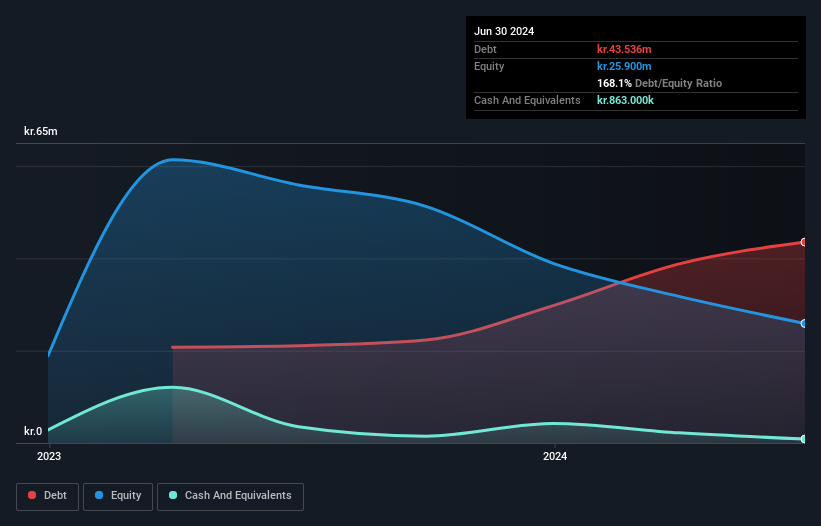Would Pharma Equity Group (CPH:PEG) Be Better Off With Less Debt?

Warren Buffett famously said, 'Volatility is far from synonymous with risk.' It's only natural to consider a company's balance sheet when you examine how risky it is, since debt is often involved when a business collapses. Importantly, Pharma Equity Group A/S (CPH:PEG) does carry debt. But is this debt a concern to shareholders?
When Is Debt A Problem?
Debt and other liabilities become risky for a business when it cannot easily fulfill those obligations, either with free cash flow or by raising capital at an attractive price. If things get really bad, the lenders can take control of the business. While that is not too common, we often do see indebted companies permanently diluting shareholders because lenders force them to raise capital at a distressed price. By replacing dilution, though, debt can be an extremely good tool for businesses that need capital to invest in growth at high rates of return. When we examine debt levels, we first consider both cash and debt levels, together.
Check out our latest analysis for Pharma Equity Group
How Much Debt Does Pharma Equity Group Carry?
You can click the graphic below for the historical numbers, but it shows that as of June 2024 Pharma Equity Group had kr.43.5m of debt, an increase on kr.21.1m, over one year. And it doesn't have much cash, so its net debt is about the same.

A Look At Pharma Equity Group's Liabilities
We can see from the most recent balance sheet that Pharma Equity Group had liabilities of kr.32.1m falling due within a year, and liabilities of kr.18.6m due beyond that. Offsetting these obligations, it had cash of kr.863.0k as well as receivables valued at kr.60.4m due within 12 months. So it can boast kr.10.5m more liquid assets than total liabilities.
This short term liquidity is a sign that Pharma Equity Group could probably pay off its debt with ease, as its balance sheet is far from stretched. When analysing debt levels, the balance sheet is the obvious place to start. But it is Pharma Equity Group's earnings that will influence how the balance sheet holds up in the future. So if you're keen to discover more about its earnings, it might be worth checking out this graph of its long term earnings trend.
It seems likely shareholders hope that Pharma Equity Group can significantly advance the business plan before too long, because it doesn't have any significant revenue at the moment.
Caveat Emptor
Over the last twelve months Pharma Equity Group produced an earnings before interest and tax (EBIT) loss. Its EBIT loss was a whopping kr.29m. On a more positive note, the company does have liquid assets, so it has a bit of time to improve its operations before the debt becomes an acute problem. But we'd want to see some positive free cashflow before spending much time on trying to understand the stock. So it seems too risky for our taste. There's no doubt that we learn most about debt from the balance sheet. However, not all investment risk resides within the balance sheet - far from it. Case in point: We've spotted 5 warning signs for Pharma Equity Group you should be aware of, and 3 of them are significant.
When all is said and done, sometimes its easier to focus on companies that don't even need debt. Readers can access a list of growth stocks with zero net debt 100% free, right now.
New: Manage All Your Stock Portfolios in One Place
We've created the ultimate portfolio companion for stock investors, and it's free.
• Connect an unlimited number of Portfolios and see your total in one currency
• Be alerted to new Warning Signs or Risks via email or mobile
• Track the Fair Value of your stocks
Have feedback on this article? Concerned about the content? Get in touch with us directly. Alternatively, email editorial-team (at) simplywallst.com.
This article by Simply Wall St is general in nature. We provide commentary based on historical data and analyst forecasts only using an unbiased methodology and our articles are not intended to be financial advice. It does not constitute a recommendation to buy or sell any stock, and does not take account of your objectives, or your financial situation. We aim to bring you long-term focused analysis driven by fundamental data. Note that our analysis may not factor in the latest price-sensitive company announcements or qualitative material. Simply Wall St has no position in any stocks mentioned.
About CPSE:PEG
Pharma Equity Group
Through its subsidiary, Reponex Pharmaceuticals A/S, a clinical-stage biopharmaceutical company, develops treatments for diseases that have patient and social impact for which current therapy is lacking or in need of improvement.
Moderate with mediocre balance sheet.
Market Insights
Community Narratives



